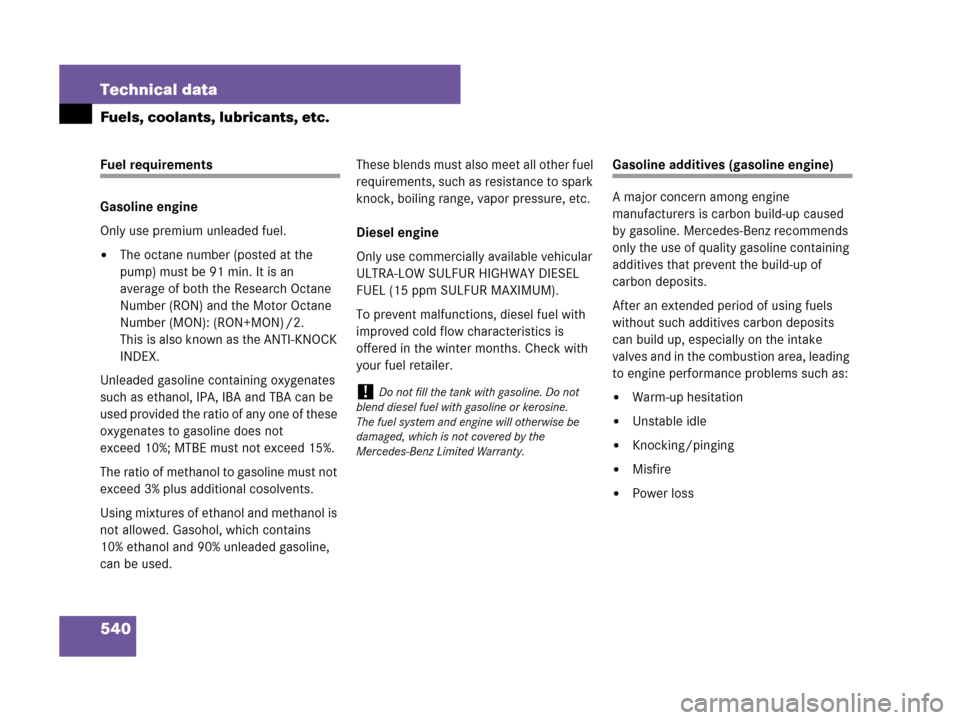Page 356 of 569

355 Operation
At the gas station
Engine oil level
For more information on engine oil, see
“Engine oil” (
�page 358).
Coolant
For normal replenishing, use water (pota-
ble water quality). For more information,
see “Coolant level” (
�page 360) and
“Fuels, coolants, lubricants, etc.”
(
�page 536).
Brake fluidWindshield/rear window washer
system and headlamp cleaning
system*
For more information on refilling the wash-
er reservoir, see “Windshield/rear window
washer system and headlamp cleaning
system*” (
�page 362).
Vehicle lighting
Check function and cleanliness. For infor-
mation on replacing light bulbs, see “Re-
placing bulbs” (
�page 480).
For more information, see “Exterior lamp
switch” (
�page 143).
Tire inflation pressure
For more information, see “Checking tire
inflation pressure” (
�page 373).
!If you find that the brake fluid in the brake
fluid reservoir has fallen to the minimum mark or
below, have the brake system checked for brake
pad thickness and leaks immediately. Contact an
authorized Mercedes-Benz Light Truck Center
immediately. Do not add brake fluid as this will
not solve the problem. For more information, see
“Brake fluid” (
�page 539).
Page 361 of 569

360 Operation
Engine compartment
Be careful not to spill any oil when adding.
Avoid environmental damage caused by oil
entering the ground or water.
�Screw filler cap1 back on filler neck.
For more information on engine oil, see
“Technical data” section (
�page 536) and
(
�page 538).
Transmission fluid level
The transmission fluid level does not need
to be checked. If you notice transmission
fluid loss or gear shifting malfunctions,
have an authorized Mercedes-Benz Light
Truck Center check the automatic trans-
mission.Coolant level
The engine coolant is a mixture of water
and anticorrosion/antifreeze. To check
the coolant level, the vehicle must be
parked on level ground.
!Excess oil must be siphoned or drained off.
It could cause damage to the engine or
emission control system not covered by the
Mercedes-Benz Limited Warranty.
Warning!G
In order to avoid any potentially serious
burns:
�Use extreme caution when opening the
hood if there are any signs of steam or
coolant leaking from the cooling system,
or if the coolant temperature display
indicates that the coolant is overheated.
�Do not remove pressure cap on coolant
reservoir if coolant temperature is
above 158°F (70°C). Allow engine to
cool down before removing cap. The
coolant reservoir contains hot fluid and
is under pressure.
�Using a rag, slowly open the cap approx-
imately 1/2turn to relieve excess pres-
sure. If opened immediately, scalding
��
Page 541 of 569

540 Technical data
Fuels, coolants, lubricants, etc.
Fuel requirements
Gasoline engine
Only use premium unleaded fuel.
�The octane number (posted at the
pump) must be 91 min. It is an
average of both the Research Octane
Number (RON) and the Motor Octane
Number (MON): (RON+MON) /2.
This is also known as the ANTI-KNOCK
INDEX.
Unleaded gasoline containing oxygenates
such as ethanol, IPA, IBA and TBA can be
used provided the ratio of any one of these
oxygenates to gasoline does not
exceed 10%; MTBE must not exceed 15%.
The ratio of methanol to gasoline must not
exceed 3% plus additional cosolvents.
Using mixtures of ethanol and methanol is
not allowed. Gasohol, which contains
10% ethanol and 90% unleaded gasoline,
can be used.These blends must also meet all other fuel
requirements, such as resistance to spark
knock, boiling range, vapor pressure, etc.
Diesel engine
Only use commercially available vehicular
ULTRA-LOW SULFUR HIGHWAY DIESEL
FUEL (15 ppm SULFUR MAXIMUM).
To prevent malfunctions, diesel fuel with
improved cold flow characteristics is
offered in the winter months. Check with
your fuel retailer.
Gasoline additives (gasoline engine)
A major concern among engine
manufacturers is carbon build-up caused
by gasoline. Mercedes-Benz recommends
only the use of quality gasoline containing
additives that prevent the build-up of
carbon deposits.
After an extended period of using fuels
without such additives carbon deposits
can build up, especially on the intake
valves and in the combustion area, leading
to engine performance problems such as:
�Warm-up hesitation
�Unstable idle
�Knocking/pinging
�Misfire
�Power loss
!Do not fill the tank with gasoline. Do not
blend diesel fuel with gasoline or kerosine.
The fuel system and engine will otherwise be
damaged, which is not covered by the
Mercedes-Benz Limited Warranty.